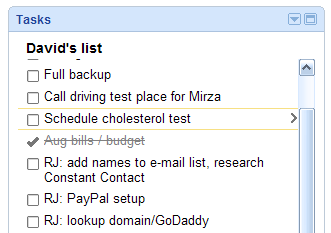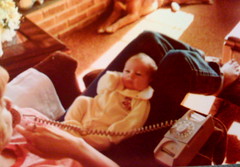
Ben Franklin famously divided his day up into sections, some for productive work, some for dining, some for letter writing and conversation, with a few hours left each day to sleep.
He knew that his time and attention were valuable. There were only so many hours in a day, and in order to have the maximum impact, his time was divided according to his priorities.
Many of us don't lay out our daily schedule in so systematic a way. We may have a to-do list or a day's worth of activities planned, but how many of us stick to so rigorous a timeframe?
Lately, though, I could use a Ben Franklin frame of mind. In the last few weeks, my life has become increasingly complicated, and too often I find myself with not enough hours left at the end of the day. And sleep? What's that?
Considering that I keep myself occupied enough as it is, throw in a part-time freelance job, an exercise regimen, a blog, a Pakistani neighbor, and a hobby or two, and time seems to be in short supply. It's no one's fault but my own, but it's a heavy burden to bear.
And still there are things I want to do. I want to learn how to make better web sites. I want to play my guitar. I want to mess around with my Macs. I'd love to do more writing. There are tons of books, magazines, and blog posts that I'd love to sit down and digest. Oh, and eating is pretty swell, too. I'd like to do that.
Which leads me to say there is only so much time, and therefore only so much attention I can pay to any one thing. The key is in prioritizing.
If I were to lay out my own Franklin-style daily plan, it would look something like this:

There seems like a lot of open space in there, but I have to be realistic. Things come up, I have a great new relationship, and there has to be time for relaxing and sponteniety. This is just the stuff I have to do.

I use several tools to help me manage all this. My first, and most essential, is probably my to-do list, which I manage with Google's wonderful (and ubiquitous, thanks to my iPhone) Tasks app. With Tasks, I can pop something on my list from wherever (home, work, out and about) I am. When something's done, I check it off. I prioritize when I need to.

Secondly, I keep my entire life - my budget, my writing, my necessary files - on a USB thumb drive. It's 128 megabytes of portable sanity, and I keep it around wherever I go. What's amazing is that all of the files I need can hang out on something that's smaller than a CD-ROM.
From my Lexar drive, I transport files, ideas, and pictures from computer to computer, but I make sure to back it up constantly. I've lost it before. If it was gone for good, I want to have a backup.
To manage everything online, I'm a huge fan of my Google account - a combination of iGoogle, Google Reader, Blogger, and my Gmail account.
iGood is like a heads-up display of all the news, weather, stock quotes, to-do list (Tasks), and e-mail (Gmail) that I need. I use Google Reader to keep track of my favorite blogs and sites, and Blogger helps me manage both my personal blog and my Recycling Jackson blog. I used to keep all my Newton Poetry stuff straight with an iGoogle Wordpress widget, but now that I'm self-hosting the blog, that option is gone.

My iPhone carries obvious benefits thanks to apps and bookmarks stored on my homepages. With Twitterrific (for Twitter), Facebook, Google Tasks, PocketMoney (for finances), and various blog/web site bookmarks (like my online banking), I keep everything I need on a daily basis confined to the first two screens on my iPhone. Everything after that is stuff I only check once in a while, like eBay and Flickr.
What works for me is to fill little pockets of time, like eating breakfast or waiting in line somewhere, with stuff I like to read and think about, and then have the tools I like handy so I can make sense of it all. When I think about it, I ingest a lot of data over the course of a day. They trick is to have a way to digest it all.
I gave up regular TV watching a long time ago. Now, there are just a few things I watch: "The Office," football, and now "Mad Men." Instead, I read when I eat - even during lunch at work. I write before work. I exercise after dinner. And I fill in random time slots with stuff on my to-do list, like having my laundry going while I cook dinner or do work.
There are big things in my life that get the lion's share of my attention, and deservedly so. Everything else gets taken care of when I have a free second. Lately, I have less "free seconds" to go around, but I make do.
The important thing is to, like Ben Franklin, have a plan. Even if you don't stick to it all the time, something is better than nothing.















